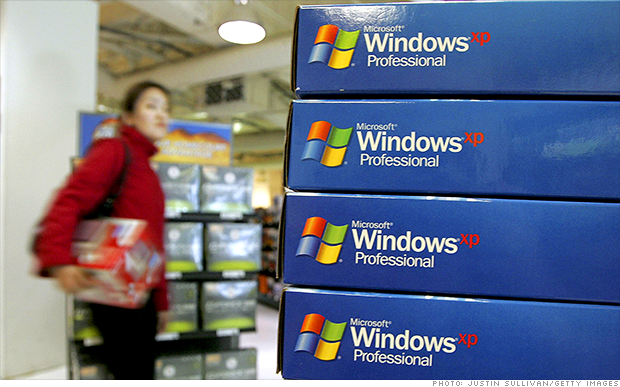Microsoft is about to take Windows XP off life support
On April 8, Windows XP's life is coming to an end. On that day, Microsoft will stop issuing security updates to the 12-year-old operating system, and it will end nearly all technical support as well.
You wouldn't think that killing off an operating system that debuted in the first year of the Bush administration would ruffle too many feathers. But an amazing 29% of computers across the globe are still running Windows XP, according to NetMarketShare. That makes it the world's second most widely used operating system, just behind Windows 7.
Microsoft's (MSFT, Fortune 500) plan to end support for XP doesn't mean that a third of the world's PCs will just stop functioning on April 8. But there are some very real consequences of continuing to use the operating system.
After April 8, Windows XP computers will be more susceptible to malware and viruses beginning, since Microsoft will no longer address major holes in the software. Although antivirus software will continue to fend off some malicious attacks, Microsoft's security updates provide an essential line of defense.
For Windows XP users, the best course of action is to bite the bullet and buy a copy of Windows 8. The problem is that most older computers won't be able to upgrade to Windows 8. Many of those consumers will have to buy a new PC. Microsoft has anupgrade assistant that allows people to determine whether their computers are compatible with the latest version of Windows.
For those who are able to upgrade but aren't ready to make the jump to the fully redesigned Windows 8, Windows 7 is an option. It's still on sale, offers a more familiar PC experience and will be supported until 2020.
The Windows XP impact will be felt more by companies than by consumers. Forrester Research estimates that 20% of North American and European corporate computers are still running Windows XP. But that will soon change: Forrester forecasts that only 6% of those companies' PCs will be running Windows XP by April.
That remaining 6% will predominately be small and medium-sized companies and government agencies, where budget restraints may pose a problem, according to Scott Dowling, a Microsoft software consultant for En Pointe Technologies. The vast majority of large Western businesses have already upgraded to Windows 7 or Windows 8, but small businesses have been slower at catching up.

